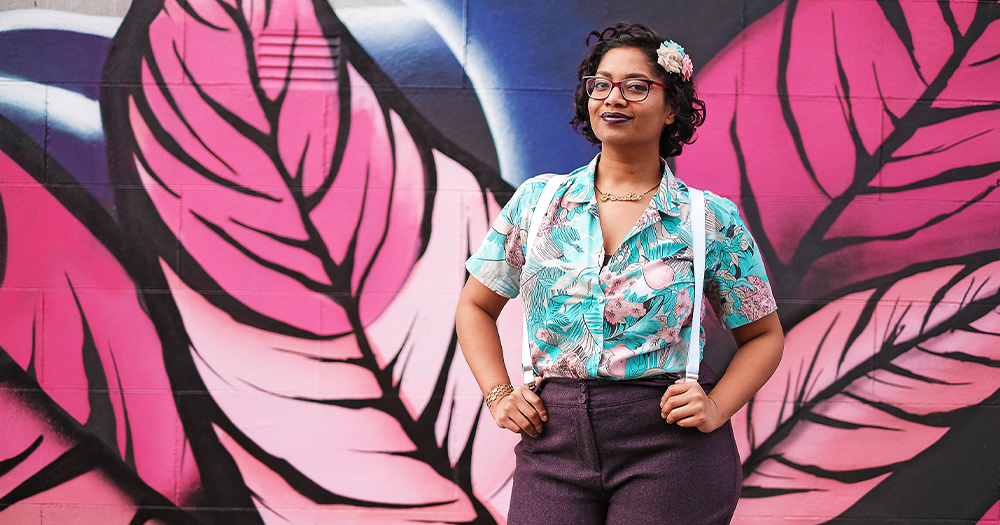To celebrate Anti Racism Month, Pradeep Mahadeshwar talks with queer artists of colour living in Ireland. In this interview, he speaks with writer, poet and performer, Chandrika Narayanan-Mohan.
Some people come across as a fountain of positive vibes. Writer and performer Chandrika Narayanan-Mohan (she/her) is one of those people. Chandrika’s poetry recently appeared in Green Carnations, Glas na Gile and her varied work has been capturing fans along the way.
In Ireland since 2012, Chandrika described her background; “I am Burmese-Indian and was born in New Delhi. My mother worked as a diplomat, so I’ve also lived in North America, Sweden, the UK, and Turkey. I studied Art History and English Literature in the UK, and interned in various arts organisations in London.
“Living as an immigrant has many challenges. I was supposed to start my second MA in London when the UK changed the visa policy for international students, and suddenly I had to find a new country to move to. I found the UCD Arts Management and Cultural Policy MA, and within a few weeks, I left seven years of my life behind to start from scratch here in Dublin. I’ve worked at Business to Arts and I am now Marketing and Development Manager for Fishamble: The New Play Company. Also, I do cultural consultancy.”
Chandrika’s grandfather, the late KR Narayanan, the former President of India, was a proud feminist, and her family is known for being progressive. While she has lived away from India for an extended period as a migrant, the collective mixture of these life experiences reflects her work and creative process. “I am fortunate to have grown up without anxiety about my sexuality, and I think that’s why it’s not part of my art. My childhood hairdresser was a drag queen, and my godfathers are a gay Australian couple. I came out to my family last year without any issues.
“However, being an immigrant is another story; it has dictated every part of my life since I was 18. Living as an immigrant on work permits in Ireland, I have experienced constant uncertainty and anxiety, but now I can finally apply for citizenship. The otherness of being a migrant is woven into my work because it affects every single part of my life: my sexuality does not.”
“When it comes to other people’s attitudes towards me, I haven’t had issues in terms of queerness,” she continues. “But even my close friends sometimes want me to fit into the Indian stereotype, and make ‘you’re the whitest Indian I know’ jokes just because I don’t have an Indian accent, cook curry, or wear a sari. I’ve encouraged those jokes as a way of disarming my white friends and assimilating quickly into Irish society over the years. But I’ve compromised my identity for the sake of ‘belonging’ for too long, and now it’s time to own my strange mixed identity. If I don’t fit someone’s idea of what being Indian is, that’s their problem, not mine!”
Chandrika has found that her writing is how she overcompensates for her sense of otherness over the years. In her essay published in the Hold Open the Door anthology by UCD Press, she wrote about her cultural anxiety for the first time. She has begun to write more about her past, before ‘immigrant’ became her identity. “It’s a strange journey, and therapy is a big part of unlocking that side of me. But I know I am only just beginning.”
The visibility of immigrant Asian women in contemporary Irish literature and mainstream media is one of my favourite topics to discuss. Chandrika conveys her thoughts on it. “Irish mainstream media is blindingly white. However, it’s fantastic to see more Asian names appear in Irish journals and publications and to see writers like Cauvery Madhavan, Tapasya Narang, and Nidhi Zak/Aria Eipe getting visibility.
“I think Irish organisations need to actively approach arts groups of other nationalities and backgrounds rather than waiting for them to turn up on their doorstep. Once they make that effort, the pool of Irish-based talent widens considerably. We aren’t ‘new’; we’re just underrepresented.”
Chandrika has advice for the emerging QPOC artists living in Ireland; “Developing your practice is a two-way street: Yes, institutions and organisations need to do the work, but we need to reach out and connect. My advice is, don’t wait for people to ‘discover’ you: attend as many events and workshops as possible, keep learning, and do the work!
“I am an anxious introvert who only took my creative career seriously a few years ago, so I know it’s tiring and scary at times. As an immigrant in Ireland, forming real, meaningful friendships is challenging and takes years. But the friendships that have blossomed from creative groups have become a big part of my life. Home is a complicated concept for me, but being part of the Irish creative community is the closest thing to home I’ve ever known.”
To learn more about Chandrika Narayanan-Mohan, visit her website here and follow her on Instagram.
For more of Pradeep Mahadeshwar’s work, follow him on Instagram.
© 2021 GCN (Gay Community News). All rights reserved.
Support GCN
GCN is a free, vital resource for Ireland’s LGBTQ+ community since 1988.
GCN is a trading name of National LGBT Federation CLG, a registered charity - Charity Number: 20034580.
GCN relies on the generous support of the community and allies to sustain the crucial work that we do. Producing GCN is costly, and, in an industry which has been hugely impacted by rising costs, we need your support to help sustain and grow this vital resource.
Supporting GCN for as little as €1.99 per month will help us continue our work as Ireland’s free, independent LGBTQ+ media.
